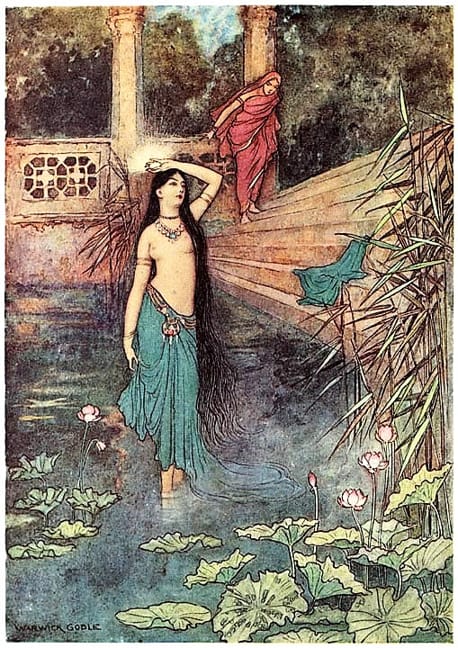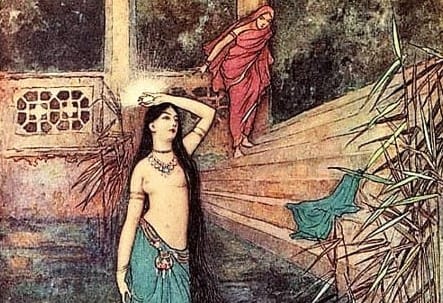- Phakir Chand (Folk-Tales of Bengal) – Part I
- Phakir Chand (Folk-Tales of Bengal) – Part II
- Phakir Chand (Folk-Tales of Bengal) – Part III
The Rajah, distracted with grief on account of the obscuration of his son’s intellects, caused a proclamation to be made in the capital by the beat of the drum, to the effect that, if any person could explain the cause of his son’s madness and cure it, such a person would be rewarded with the hand of the Rajah’s daughter, and with the possession of half his kingdom. The drum was beaten around most parts of the city, but no one touched it, as no one knew the cause of the madness of the Rajah’s son. At last, an old woman touched the drum and declared that she would not only discover the cause of the madness but cure it. This woman, who was the identical woman that was gathering sticks near the tank at the time the Rajah’s son lost his reason, had a crack-brained son of the name of Phakir Chand and was in consequence called Phakir’s mother, or more familiarly Phakre’s mother. When the woman was brought before the Rajah, the following conversation took place:-
Rajah. You are the woman who touched the drum. You know the cause of my son’s madness?
Phakir’s Mother. Yes, O incarnation of justice! I know the cause, but I will not mention it till I have cured your son.
Rajah. How can I believe that you are able to cure my son when the best physicians of the land have failed?
Phakir’s Mother. You need not now believe, my lord, till I have performed the cure. Many an old woman knows secrets with which wise men are unacquainted.
Rajah. Very well, let me see what you can do. At what time will you perform the cure?
Phakir’s Mother. It is impossible to fix the time at present, but I will begin work immediately with your lordship’s assistance.
Rajah. What help do you require from me?
Phakir’s Mother. Your lordship will please order a hut to be raised on the embankment of the tank where your son first caught the disease. I mean to live in that hut for a few days. And your lordship will also please order some of your servants to be in attendance at a distance of about a hundred yards from the hut, so that they might be within call.
Rajah. Very well; I will order that to be immediately done. Do you want anything else?
Phakir’s Mother. Nothing else, my lord, in the way of preparations. But it is as well to remind your lordship of the conditions on which I undertake the cure. Your lordship has promised to give to the performer of the cure the hand of your daughter and half your kingdom. As I am a woman and cannot marry your daughter, I beg that, in case I perform the cure, my son Phakir Chand may marry your daughter and take possession of half your kingdom.
Rajah. Agreed, agreed.
A temporary hut was a few hours erected on the embankment of the tank, and Phakir’s mother took up her abode in it. An outpost was also erected at some distance for servants in attendance who might be required to give help to the woman. Strict orders were given by Phakir’s mother that no human being should go near the tank except herself. Let us leave Phakir’s mother keeping watch at the tank, and hasten down into the subterranean palace to see what the prince and the princess are about.
After the mishap which had occurred on her last visit to the upper world, the princess had given up the idea of a fourth visit. But women generally have greater curiosity than men, and the princess of the underground palace was no exception to the general rule.
One day, while her husband was asleep as usual after his noonday meal, she rushed out of the palace with the snake jewel in her hand and came to the upper world. The moment the upheaval of the waters in the middle of the tank took place, Phakir’s mother, who was on the alert, concealed herself in the hut and began looking through the chinks of the matted wall. The princess, seeing no mortal nearby, came to the bank, and sitting there began to scrub her body.

Phakir’s mother showed herself outside the hut, and addressing the princess, said in a winning tone—“Come, my child, thou queen of beauty, come to me, and I will help you to bathe.” So saying, she approached the princess, who, seeing that it was only a woman, made no resistance. The old woman, while in the act of washing the hair of the princess, noticed the bright jewel in her hand, and said—“Put the jewel here till you are bathed.”
In a moment the jewel was in the possession of Phakir’s mother, who wrapped it up in the cloth that was round her waist. Knowing the princess was unable to escape, she gave the signal to the attendants in waiting, who rushed to the tank and made the princess a captive.
Great were the rejoicings of the people when the tidings reached the city that Phakir’s mother had captured a water nymph from the nether regions. The whole city came to see the “daughter of the immortals,” as they called the princess.
When she was brought to the palace and confronted with the Rajah’s son of obscured intellect, the latter said with a shout of exultation—“I have found! I have found!” The cloud which had settled on his brain was dissipated in a moment. The eyes, erewhile vacant and lustreless, now glowed with the fire of intelligence; his tongue, of which he had almost lost the use—the only words which he used to utter being, “Now here, now gone!”—was now relaxed: in a word, he was restored to his senses.
The joy of the Rajah knew no bounds. There was great festivity in the city, and the people who showered benedictions on the head of Phakir Chand’s mother expected the speedy celebration of the marriage of the Rajah’s son with the beauty of the nether world. The princess, however, told the Rajah, through Phakir’s mother, that she had made a vow to the effect that she would not, for one whole year, look at the face of another man than that of her husband who was dwelling beneath the waters, and that therefore the marriage could not be performed during that period. Though the Rajah’s son was somewhat disappointed, he readily agreed to the delay, believing, agreeably to the proverb, that delay would greatly enhance the sweetness of those pleasures that were in store for him.
It is scarcely necessary to say that the princess spent her days and her nights in sorrowing and sighing. She lamented that idle curiosity that had led her to come to the upper world, leaving her husband below. When she recollected that her husband was all alone below the waters she wept bitter tears. She wished she could run away. But that was impossible, as she was immured within walls, and there were walls within walls. Besides, if she could get out of the palace and of the city, to what avail would it be? She could not gain her husband, as the serpent jewel was not in her possession. The ladies of the palace and Phakir’s mother tried to divert her mind but in vain. She took pleasure in nothing; she would hardly speak to anyone; she wept day and night.
The year of her vow was drawing to a close, and yet she was disconsolate. The marriage, however, must be celebrated. The Rajah consulted the astrologers, and the day and the hour in which the nuptial knot was to be tied were fixed. Great preparations were made. The confectioners of the city busied themselves day and night in preparing sweetmeats; milkmen took contracts for supplying the palace with tanks of curds; gunpowder was being manufactured for a grand display of fireworks; bands of musicians were placed on sheds erected over the palace gate, who ever and anon sent forth many “a bout of linked sweetness”; and the whole city assumed an air of mirth and festivity.
It is time we should think of the minister’s son, who, leaving his friend in the subterranean palace, had gone to his country to bring horses, elephants, and attendants for the return of the king’s son and his lovely princess with due pomp. The preparations took him many months; and when everything was ready he started on his journey, accompanied by a long train of elephants, horses, and attendants.
He reached the tank two or three days before the appointed day. Tents were pitched in the mango-topes adjoining the tank for the accommodation of men and cattle, and the minister’s son always kept his eyes fixed on the tank. The sun of the appointed day sank below the horizon, but the prince and the princess dwelling beneath the waters made no sign. He waited two or three days longer; still, the prince did not make his appearance. What could have happened to his friend and his beautiful wife? Were they dead? Had another serpent, possibly the mate of the one that had died, beaten the prince and the princess to death? Had they somehow lost the serpent-jewel? Or had they been captured when they were once on a visit to the upper world? Such were the reflections of the minister’s son. He was overwhelmed with grief.
Ever since he had come to the tank he had heard at regular intervals the sound of music coming from the city which was not distant. He inquired of passers-by what that music meant. He was told that the Rajah’s son was about to be married to some wonderful young lady, who had come out of the waters of that very tank on the bank of which he was now seated, and that the marriage ceremony was to be performed on the day following the next. The minister’s son immediately concluded that the wonderful young lady of the lake who was to be married was none other than the wife of his friend, the king’s son.
He resolved therefore to go into the city to learn the details of the affair and try if possible to rescue the princess. He told the attendants to go home, taking with them the elephants and the horses; and he himself went to the city, and took up his abode in the house of a Brahman.
After he had rested and taken his dinner, the minister’s son asked the Brahman what the meaning was of the music that was heard in the city at regular intervals.
The Brahman asked, “From what part of the world have you come that you have not heard of the wonderful circumstance that a young lady of heavenly beauty rose out of the waters of a tank in the suburbs and that she is going to be married the day after to-morrow to the son of our Rajah?”
Minister’s Son. No, I have heard nothing. I have come from a distant country whither the story has not reached. Will you kindly tell me the particulars?
Brahman. The Rajah’s son went out a-hunting about this time last year. He pitched his tents close to a tank in the suburbs. One day, while the Rajah’s son was walking near the tank, he saw a young woman, or rather goddess, of uncommon beauty rise from the waters of the tank. She gazed about for a minute or two and disappeared. The Rajah’s son, however, who had seen her, was so struck with the heavenly beauty that he became desperately enamoured of her. Indeed, so intense was his passion, that his reason gave way; and he was carried home hopelessly mad. The only words he uttered day and night were—“Now here, now gone!” The Rajah sent for all the best physicians in the country to restore his son to his reason, but the physicians were powerless. At last, he caused a proclamation to be made by the beat of the drum to the effect that if anyone could cure the Rajah’s son, he should be the Rajah’s son-in-law and the owner of half his kingdom. An old woman, who went by the name of Phakir’s mother, took hold of the drum and declared her ability to cure the Rajah’s son. On the tank where the princess had appeared was raised for Phakir’s mother a hut in which she took up her abode; and not far from her hut another hut was erected for the accommodation of attendants who might be required to help her. It seems the goddess rose from the waters; Phakir’s mother seized her with the help of the attendants and carried her in a palki to the palace. At the sight of her the Rajah’s son was restored to his senses; and the marriage would have been celebrated at that time but for a vow which the goddess had made that she would not look at the face of any male person till the lapse of a year. The year of the vow is now over, and the music that you have heard is from the gate of the Rajah’s palace. This, in brief, is the story.
Minister’s Son. A truly wonderful story! And has Phakir’s mother, or rather Phakir Chand himself, been rewarded with the hand of the Rajah’s daughter and with the possession of half the kingdom?
Brahman. No, not yet. Phakir has not been got hold of. He is a half-witted lad, or rather quite mad. He has been away for more than a year from his home, and no one knows where he is. That is his manner; he stays away for a long time, suddenly comes home, and again disappears. I believe his mother expects him soon.
Minister’s Son. What like is he? and what does he do when he returns home?
Brahman. Why, he is about your height, though he is somewhat younger than you. He puts on a small piece of cloth around his waist, rubs his body with ashes, takes the branch of a tree in his hand, and, at the door of the hut in which his mother lives, dances to the tune of dhoop! dhoop! dhoop! His articulation is very indistinct; and when his mother says—“Phakir! stay with me for some days,” he invariably answers in his usual unintelligible manner, “No, I won’t remain, I won’t remain.” And when he wishes to give an affirmative answer, he says, “Hoom,” which means “Yes.”
Conversation with the Brahman poured a flood of light into the mind of the minister’s son. He saw how matters stood. He perceived that the princess of the subterranean palace must have alone ventured out into the tank by means of the snake jewel; that she must have been captured alone without the king’s son; that the snake jewel must be in the possession of Phakir’s mother; and that his friend, the king’s son, must be alone below the waters without any means of escape. The desolate and apparently hopeless state of his friend filled him with unutterable grief. He was in deep musings during most part of the night. Is it impossible, thought he, to rescue the king’s son from the nether regions? What if, by some means or other, I contrive to get the jewel from the old woman? And can I not do it by personating Phakir Chand himself, who is expected by his mother shortly? And possibly by the same means I may be able to rescue the princess from the Rajah’s palace. He resolved to act as the rôle of Phakir Chand the following day.
Continued..



